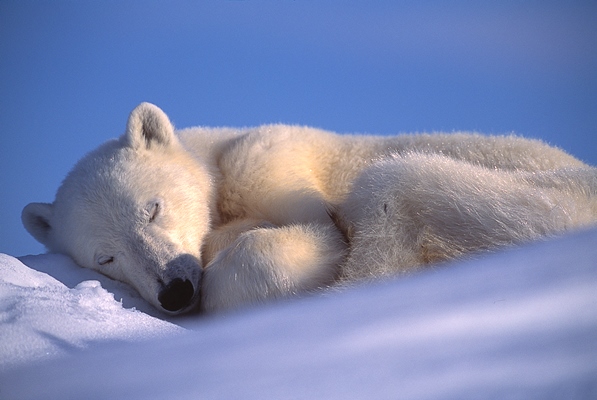

At just under an hour and 15 minutes, Picture of His Life is shorter than your average documentary. Yet that brief running time unpacks a detailed history of photographer Amos Nachoum’s goals, fears, and perspective on life, creating a more complex figure than most films achieve in two hours or more.
There’s a deep philosophical and spiritual drive to this man, who spent most of his later years capturing the wonders of the aquatic world at the expense of his personal life. Because the filmmakers explore that passion so thoroughly, they turn his goal of photographing a polar bear in the water into a more emotionally rewarding experience than could have been anticipated.
At 66 years old, Nachoum has lived a complicated life. Born in Israel in 1954, Nachoum and his sisters grew up with a father who fought during the initial Israeli-Palestinian conflict and never fully recovered from PTSD. This created a rift between father and son—some of it physical—that led to Nachoum undergoing his own trauma during the Yom Kippur War. After immigrating to the United States shortly afterwards, he then emerged as an experienced diver and underwater photographer, capturing images of everything from killer whales to manta rays to seals in their natural habitat. It’s a hefty career that, as the film points out, masks a ton of emotional scars from his past.
Nachoum, joined by his camera crew and some Inuit hunters, ventures into the Canadian Arctic in search of a polar bear, the one animal that’s eluded his camera’s gaze. There’s a lot of preparation that’s gone into locating the marine mammal and only five days to do it. Part of the challenge is that polar bears not only swim twice as fast as humans but they are also one of the few carnivores where we rank among their dinner palette. Yet finding one in the water is even harder thanks to climate change melting the sea ice beds, leaving them without a sustainable natural habitat. This makes it imperative that Nachoum do this now, while he and the polar bear are both still around.
We repeatedly see him diving into freezing waters in a wetsuit (he’s in his 60s, mind you) with a heavy camera, showcasing fearlessness and proficiency. Yet Nachoum is very tight-lipped about his past, especially when the film pivots from the Artic to Tel Aviv and we observe his troubled family problems. He engaged with death as both a soldier and war photographer, so maybe capturing life in its natural state, untouched by human violence, helps heal old wounds.
Amos is “married to the ocean” as one individual describes it, at peace with his profession and uninterested in starting a family. This hurts his father, who wanted his son to become a carpenter and get married. There’s definitely a bit of ego to Nachoum’s profession—a colleague admits the photographer is partially driven by a desire to stay relevant. However, Jewish culture believes in l’dor v’dor, passing something down from generation to generation. This not only affects Nachoum and the polar bears but also the local Inuit guides, who recognize that their culture is in decline. At one point, a guide discusses the importance of teaching his son how to hunt, wanting to provide some form of wisdom before the world fully modernizes.
Adam Ravetch’s camerawork gives the documentary a unique atmospheric style. In between still photos, stock footage, and drone bird’s-eye shots is a vision of the Arctic as isolated and serene, at least until Nachoum gets up close with the bears. Then the tone becomes incredibly tense, as you feel the dangers of the job as he puts his body on the line for an image no one has ever seen before. It’s like watching a real-life Moby Dick, only there’s no anger between man and a great white mammal that happens to be a polar bear instead of a whale.
Picture of His Life is about a fascinating man achieving a once in a lifetime goal for personal and spiritual reasons. It’s a simple quest, but, much like Amos Nachoum’s photos, the results are deeply cathartic.
















Leave A Comment